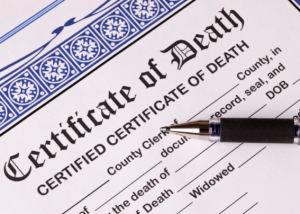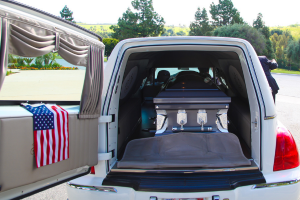
Updated: August 16, 2023
Immediate Tasks
There are tasks that should be done as soon as possible after your loved one’s death. You want to notify immediate family for many reasons, but and there are a few time-sensitive tasks that can’t wait. Some of them may have been planned and arranged ahead of time. If you are not sure, you can look for specific documents, check the will and advance directives, or (if it is not you) consult with the executor or healthcare power of attorney.
Report their death and get a legal pronouncement of death
 After your loved one has died, someone will need to confirm and report their death to the proper authorities. This is usually a medical professional such as a doctor or coroner, although in some states it can be done by registered nurses, nurse practitioners, or physicians’ assistants.
After your loved one has died, someone will need to confirm and report their death to the proper authorities. This is usually a medical professional such as a doctor or coroner, although in some states it can be done by registered nurses, nurse practitioners, or physicians’ assistants.
Your loved one has to be pronounced dead before you will be able to obtain the death certificate that is necessary for settling their estate.
The death certificate is usually completed by this medical professional and a funeral or crematorium director. If your loved one dies in a hospital, nursing home, or other facility, these will be taken care of by staff.
If your loved one and family prefer a death at home, these arrangements will fall to you. If there is an opportunity, plan and arrange for a pronouncement of death in advance.
- If they die at home while in hospice care, you can call the hospice nurse.
- If you are planning a home death without using hospice, you will usually arrange to have this done through your loved one’s primary care provider. In some states you may be able to contact your local medical examiner’s office or the county coroner. Call their office ahead of time.
- If you cannot make arrangements ahead of time, you may be left with the unfortunate situation of having to call the police or 911. This is the only option if your loved one’s death is unexpected.
- When you call 911 your house may be full of emergency responders and your neighborhood with emergency vehicles, even if you explain that the situation is an expected death.
- EMTs may perform unwanted CPR and interventions, even if you show them a DNR Order and POLST.
- Responders may be obligated to take your loved one to an emergency room where the ER doctor can pronounce death. If not, they can tell you what to do next.
Arrange for Organ Donation or Other Bequeathal Instructions, if Applicable
Organ donation is time-sensitive, so it’s important to act quickly.
- You may already know your loved one’s donor status, but check their driver’s license and/or advance directive to be sure.
- You may find a phone number to call. If not, you can call the nearest hospital to find out about what to do. If your loved one is to be a donor and is admitted to a hospital or other facility, let the staff know; it could be included in their orders. Let them know immediately if death occurs and they are not aware of their donor status. They will handle any calls that need to be made.
- Advance Directives, such as Final Instructions, Disposition of Remains Authorization, Healthcare Proxy, and/or Designated Agent forms will most likely have details about your loved one’s preferences for organ/tissue donation.
- For further details see the Organ Donation section.
Arrange Transportation
 If your loved one died in a hospital, nursing home, or other facility, they usually require the removal of the body within a few hours after death. The staff will help you make arrangements for transportation of the body.
If your loved one died in a hospital, nursing home, or other facility, they usually require the removal of the body within a few hours after death. The staff will help you make arrangements for transportation of the body.
If your loved one dies at home, it will be up to you.
It is legal in all states to keep your loved one’s body at home after they die until a coroner or representative from the funeral home, mortuary, or cremation service you are using arrives to get it. If their death was expected, there is no need to call right away. You can spend some time with them before you call.
When you are ready, call a funeral home, mortuary, or cremation service to claim their body for burial or cremation.
- If your loved one and/or you have already made plans, you can simply carry out the plan. In about half the states, family is obliged to honor written wishes and you must follow through with their personal preferences of where to be transported to.
- If not, you will need to make plans based on preferences.
- Even if your loved one’s death was unexpected, you may know their funeral, burial, or cremation preference. Even if you do know, it is best to check by referring to any documents that state this, such as their will or advance directives.
- If there are no known or documented preferences or you oppose their preferences and your state allows it, the choice becomes yours. Take time to look into your options before calling.
- The Honoring Your Loved One section has information on how to carry out these plans and contending with funeral homes.
If your loved one made arrangements to donate their body to a medical school or other institution, you could contact them to transport the body if the authorities will allow a direct transfer.
If an autopsy is needed, the coroner will arrange transportation to the appropriate facility.
Notify Immediate Family and Close Friends
While it is important to inform those closest to your loved one about their death, this will also allow them to provide support, comfort, and assistance with the many tasks that need to get done. You may need them to help make decisions about a funeral or burial if none had been made beforehand and come with you to make arrangements.
- Contact them by the most efficient way possible, based on their preferences, which should be determined beforehand if there is enough warning.
- Although this is usually by phone, you may prefer the intimacy of delivering the news face-to-face to some of them. Some may be content with a text or email.
At this point, you may want to contact clergy for support and/or if your faith or culture have a death ritual. You, someone who volunteered, or was designated by you can notify the rest of the family as time permits.
Arrange Care for any Dependents or Pets
 If your loved one had any children or other dependents, you must arrange care for them right away.
If your loved one had any children or other dependents, you must arrange care for them right away.
- It could be you, but remember you will be busy making arrangements and distracted by the situation.
- If it is not you, this person should be someone the children or dependents are close to and trust.
You may need to make arrangements to care for pets.
- This does not need to be done right away, but certainly by the next feeding time.
- It may not be crucial who this person is.
Secure/Lock Major Property
After your loved one has died, their property may be at risk of being stolen or vandalized.
- If they lived on their own, make sure their home and any vehicles are locked and secured.
- If their home will be vacant for some time, consider notifying the landlord and/or the police, so they can help watch the property.
